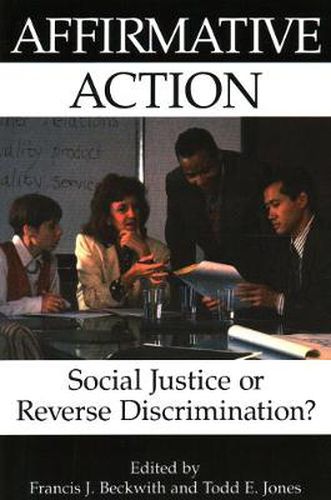Readings Newsletter
Become a Readings Member to make your shopping experience even easier.
Sign in or sign up for free!
You’re not far away from qualifying for FREE standard shipping within Australia
You’ve qualified for FREE standard shipping within Australia
The cart is loading…






What is our goal: equal opportunity or equality of result? The debate rages on. The 5 November 1996 decision by voters in California to eliminate most forms of state sanctioned affirmative action ignited a civil rights debate that sent shock waves across the country. The vote had critics celebrating the dawn of a new era of equal rights, while opponents warned of school and workplace discrimination without the protective blanket of affirmative action. The question of racial equality has inspired new debate today, reminiscent of the conflicts of the 1960s. Again we ask ourselves: Is affirmative action necessary to maintain equal labour practices, school desegregation plans, and broad social standards of racial equality? Does affirmative action or laws to roll it back go against the idea of equality itself? Should race play an important role in college admissions and corporate hiring? Is affirmative action a poison instead of a cure? For some, it depends on how the term is defined.These and other questions are debated in this highly charged collection of essays by a distinguished group of politicians, philosophers, educators, and others including Tom Beauchamp, Ward Connerly, Ronald Dworkin, Stanley Fish, Lyndon Johnson, Nicholas LeMann, Louis Pojman, George Sher, Thomas Sowell, Shelby Steele, Judith Jarvis Thomson, Richard Wasserstrom, Cornell West, and Steven Yates. Included also in this book are important legal decisions bearing on affirmative action.
$9.00 standard shipping within Australia
FREE standard shipping within Australia for orders over $100.00
Express & International shipping calculated at checkout
What is our goal: equal opportunity or equality of result? The debate rages on. The 5 November 1996 decision by voters in California to eliminate most forms of state sanctioned affirmative action ignited a civil rights debate that sent shock waves across the country. The vote had critics celebrating the dawn of a new era of equal rights, while opponents warned of school and workplace discrimination without the protective blanket of affirmative action. The question of racial equality has inspired new debate today, reminiscent of the conflicts of the 1960s. Again we ask ourselves: Is affirmative action necessary to maintain equal labour practices, school desegregation plans, and broad social standards of racial equality? Does affirmative action or laws to roll it back go against the idea of equality itself? Should race play an important role in college admissions and corporate hiring? Is affirmative action a poison instead of a cure? For some, it depends on how the term is defined.These and other questions are debated in this highly charged collection of essays by a distinguished group of politicians, philosophers, educators, and others including Tom Beauchamp, Ward Connerly, Ronald Dworkin, Stanley Fish, Lyndon Johnson, Nicholas LeMann, Louis Pojman, George Sher, Thomas Sowell, Shelby Steele, Judith Jarvis Thomson, Richard Wasserstrom, Cornell West, and Steven Yates. Included also in this book are important legal decisions bearing on affirmative action.